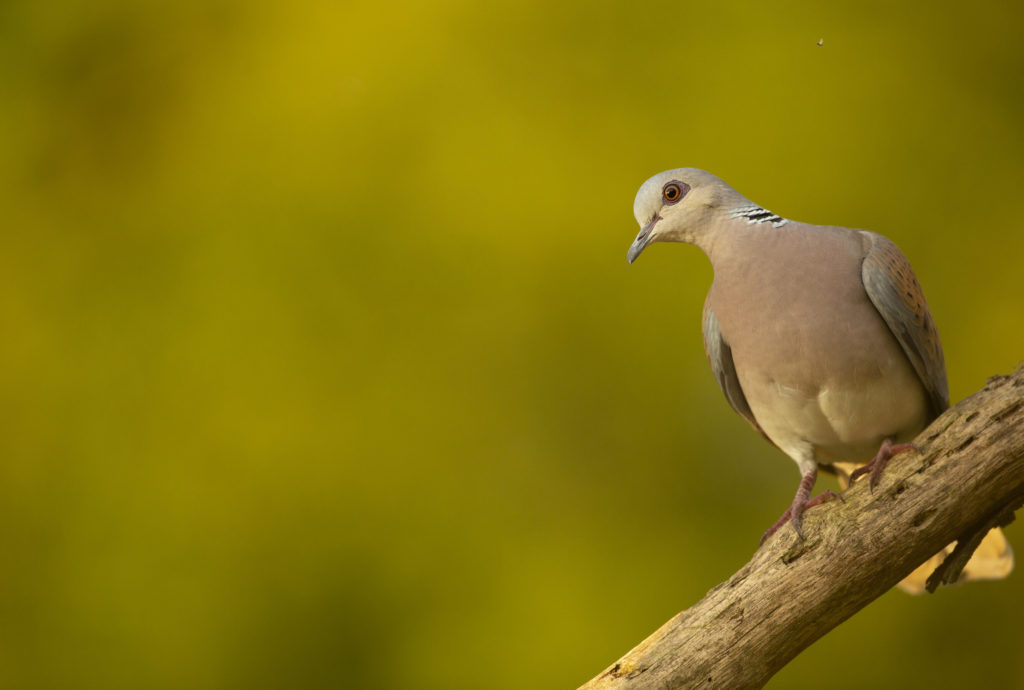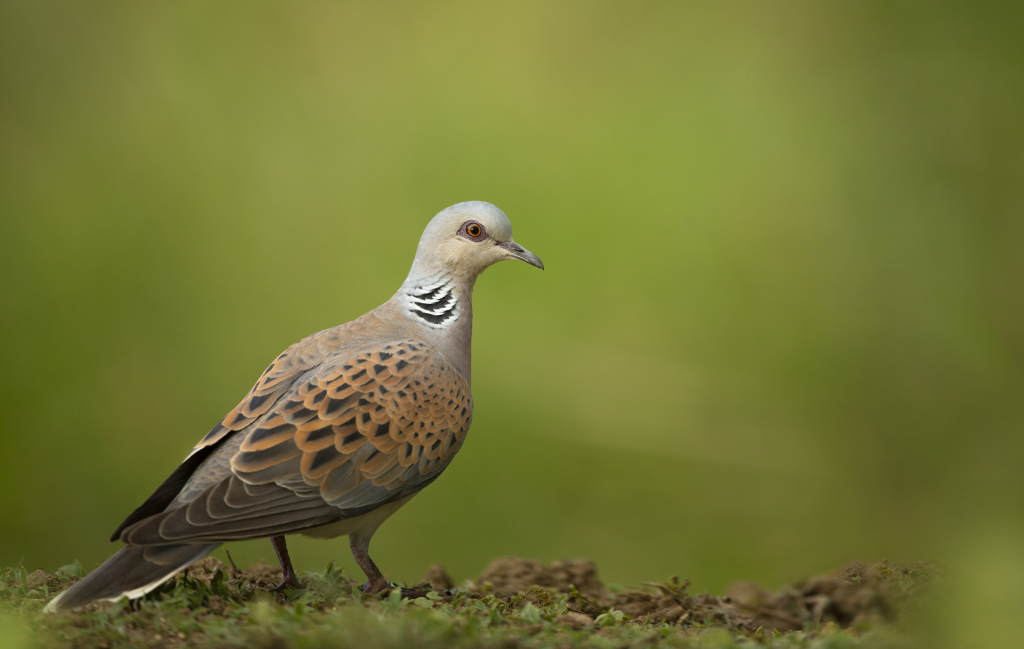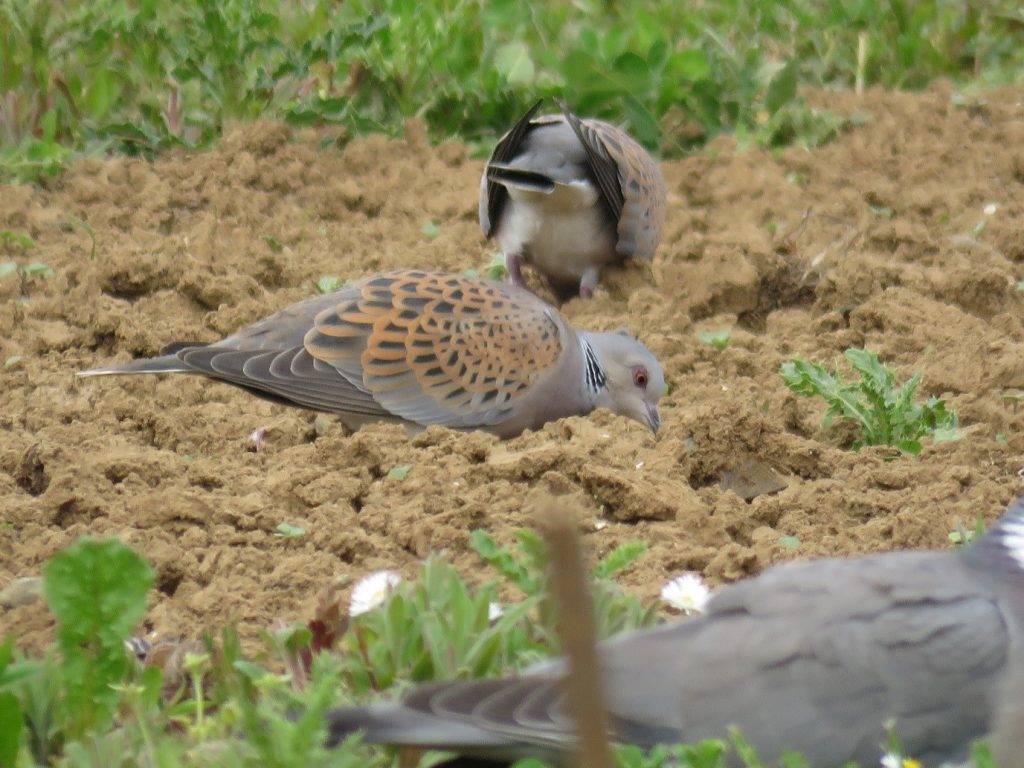Every spring we wait in anticipation for the first purring call of the turtle dove. For many, it’s a sure sign that spring is here. However, over the years it has become harder and harder to hear the familiar turr turr call as numbers of turtle doves has continued to dwindle.
The results of a new survey confirm what many of us have known for some time – turtle dove numbers are at a real low.
Over the spring and summer of 2021, an ambitious project set out to estimate the number of breeding turtle doves in the UK. Supported by Natural England, Kent Ornithological Society and coordinated by the RSPB, the project relied on a band of dedicated volunteers who headed out at dawn to survey for turtle doves in a series of locations across the country. It’s thanks to these early morning shifts and the records that were submitted that the RSPB’s Conservation Science team have been able to calculate a population estimate for turtle doves.
RSPB scientists estimate that the population of turtle doves in the UK now stands at 2,100 territories. For a bird that was once widespread, that’s a very significant drop in numbers.
However, we’ve known for a long time that turtle doves are in trouble, which is why we’ve been devising and testing conservation solutions over the last 10 years to work out how to help them. Thanks to these years of research we have a good picture of both the problems and the solutions that can help turtle doves and these are now being delivered at scale on the ground.
Simon Wotton, Senior Conservation Scientist said:
“In the 70s, there were records of flocks of over eight hundred birds, and the UK population was over 125,000 pairs. Although these results paint a stark picture with numbers, the way forward is clear and we stand a good chance of turning around the fortunes of this bird. We hope that the 2021 survey will have measured a population low point with subsequent recovery already underway.”

What does this mean for turtle dove conservation?
All is not lost. That’s the key message here. Through hard work and dedication over many years, scientists, advisors, land managers and communities have found ways to support turtle doves both in the UK and elsewhere. We are now in the privileged position of understanding what we need to do to recover the turtle dove population: 1) Improve productivity through providing the right seed food 2) Improve survival of birds on migration by stopping unsustainable levels of hunting. The good news is we’re making great progress on both fronts.
Further down the page you can find out more about our work on unsustainable hunting, here’s what we need to do in the UK:
- Provide suitable places to nest – thick hedges and thorny scrub are perfect.
- Provide suitable places to feed – turtle doves feed on a variety of seeds from wildflowers to grasses; the key is having enough bare ground so the turtle doves can land and access the seeds. Supplementary feeding of a carefully curated selection of seeds can also support turtle doves early in the season when seed availability is low in the wider countryside.
- Provide safe drinking sources – shallow-sided ponds and pools allow turtle doves to drink and bathe.
What’s more is that the results of the turtle dove survey will help us to target our action to the places where turtle doves need most help. We know what to do and where to do it, so the time to act is now.

Turtle dove champions lead the way
Fortunately for turtle doves, champions of the species have already been taking action for years and they’re seeing fantastic results.
There are many conservation advisors, from many different organisations working across England for whom turtle dove is an important focus species. Through an advisory approach they are working with many hundreds of private land managers. They are all delivering the same advice and engaging with farmers and other land managers to deliver turtle dove habitat where the species needs it most.
As an example, the RSPB has a group of Conservation Advisors working in key areas – known as Turtle Dove Friendly Zones, covering Norfolk, Suffolk, Essex, Cambridgeshire, Kent, Sussex and Hampshire. Their remit is wholly focussed on working with farmers, land managers and communities to provide advice and guidance around protecting, enhancing and creating suitable turtle dove habitats.
Eliza Leat, one of the RSPB advisors, explains what the turtle dove means to her:
“I get excited every time I hear or see a turtle dove, but especially the first one of the season. Good breeding seasons are crucial to halting and reversing their decline so there is always that extra spark and reminder when you see the first one that now is the time to make a difference, to find new hotspots and encourage current landowners that they are having an impact.”
Working with land managers to support them to create breeding habitat for turtle doves is key, as Eliza explains:
“I love working with landowners and I have learnt so much from them. It is a real privilege to be shown around someone’s land and be able to identify great turtle dove habitat and wildlife. People value knowing what species their habitats are benefiting. Even better when the farmer shows you the wildlife they are proud of, be it a rare plant, a barn owl or animals photographed by their camera traps.”
It’s important that advisors work together to share experiences and ideas:
“We work as a team despite the distances. Ideas and opportunities which are created or discovered in one area can be replicated and adapted to help turtle doves elsewhere. A perfect example of this is Nicole Khan’s work with volunteers in Kent, creating small turtle dove foraging plots managed by volunteers. It’s a really inspiring piece of work and shows how a range of people can get involved in turtle dove conservation.”

Novel ways of delivering tried and tested conservation measures
As part of the RSPB’s efforts to support turtle dove conservation we’ve been working with the University of Oxford, consultants DotEcon and EnTrade to trial innovative ways to create more turtle dove habitat.
This Defra Test and Trials project involves land managers bidding to create suitable habitat for turtle doves, in what is called a ‘reverse auction’. The bids are in and the project is now working with 49 new farmers in Suffolk and Norfolk, who, between them are putting in 120 feeding plots. Another demonstration of the efforts that people are going to, to secure a future for this special bird.
Cooperation across the species’ range leads to positive change for turtle doves
The European Turtle Dove Species Action Plan was published in 2018. The Action Plan was the result of several years of discussions, workshops and cooperation between conservation organisations, academics, governments and hunters. It highlighted the importance of improving habitat conditions on the breeding grounds as well as addressing other issues such as unsustainable hunting.
The Action Plan brought people together under a common banner of securing a future for the turtle dove. Since its publication we’ve seen workable solutions being deployed at scale in the UK and elsewhere in Europe.
A great example of this international cooperation and large-scale roll out of conservation solutions for turtle dove can be found in how the issue of unsustainable hunting in western Europe is being approached. In 2021, a temporary hunting ban for France, Spain and Portugal meant that the turtle dove’s return journey to Africa last autumn was that bit safer. Hunting regulations are reviewed every year and we’re hopeful that the ban will be extended this year and in following years, giving turtle doves some much needed breathing space.
With unsustainable hunting out of the picture in the short-term, now is the perfect opportunity to really boost habitat management efforts in the UK to ensure turtle doves have a fighting chance.
Keen to do your bit for turtle doves?
The results of the turtle dove survey show that we must take action now if we are to continue to hear the purring calls of turtle doves in spring.
If you own or manage land in key turtle dove areas there’s lots you can do to support turtle doves. Take a look at the advice pages on the Operation Turtle Dove website to find out what you can do – from creating the perfect turtle dove hedge to providing a swathe of seed-rich plants for turtle doves to forage in.
You can also get in touch with your local RSPB Turtle Dove Advisor to learn more about helping turtle doves on your patch.
Turning the tide
Let’s use the new population estimate for turtle doves as a rallying call to do all we can to turn the fortunes of this little dove around.
We know what needs to be done and we’re already doing it in many places, but we need more people to join our cause and create safe spaces for turtle doves across our farmed landscape.








